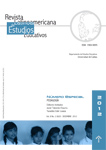Authors
Abstract
In my research about educational sciences, pedagogy and French-speaking didactics, I have bumped into the question about the pedagogue education. The complexity of such question forced me to study the written work of a contemporary pedagogue, and for strategy reasons, I immersed myself into Philippe Meirieu’s pedagogical thought. The fortune of counting with this French pedagogue’s extensive written work made easier the work since I could locate the context of his work and identify the moments of his thought. In this article I propose that a pedagogue is a superior development of the teacher’s being,whose thought build in practice, reflection, and thought generally translated as atheory-practice about education. Because of this, two objectives motivate the writing of this article. On one hand, account for a research experience and, on the other hand, to answer the question about the pedagogue education.
References
Brunelle, Lucienne. (1976). Travail de groupe et non directivité. Paris: Delagrave.
Deleuze, Gilles. (1988). “Qu’est-ce qu’un dispositif?”. En: Michel Foucault Philosophe. Rencontre international. Paris, 9, 10, 11 Janvier, 1988. Paris: Le Seuil.
________. (1991). Qu’est-ce que la philosophie? Barcelona: Anagrama.
D’Hainaut, Louis. (1977). Des fins aux objectifs en éducation. Bruxelles et Paris: Labor et Nathan.
Freinet, Celestin. (1976). Pour l’école du peuple. Paris: Maspero.
Gadamer, Hans-Georg. (2001). Verdad y método. Tomo II. Salamanca: Sígueme.
Hess, Remi. (1988). Henri Lefebvre et l’aventure du siècle. Paris: Anne-Marie Métailié.
________. (2003). Produire son oeuvre: le moment de la thèse. Paris: Téraèdre.
________. (2004). “Des dispositifs”. Revue Les irrAIductibles, No. 6, octobre.
Jay, Martín. (2009). Canto de experiencia. Variaciones modernas sobre un tema universal. Buenos Aires, Argentina: Paidós.
Journal Officiel. (2005). No. 96 du 24 avril.
Koselleck, Reinhart. (2004). Historia/Historia (traduction et introduction d’Antonio Gómez Ramos). Madrid: Trotta.
Lefebvre, Henri. (1989). La somme et le reste. Paris: Méridiens Klincksieck.
Legrand, Louis. (1983). Pour un collège plus démocratique. Rapport au ministre de l’Education nationale, La Documentation française.
Meirieu, Philippe. (1984). Outils pour apprendre en groupe - Apprendre en groupe? 2. Lyon: Chronique sociale.
________. (1997). L’envers du tableau. Paris: Esf.
________. (2001). La machine-école, entretiens avec Stéphanie le Bars. Paris: Folio-Actuel - Le Monde, Gallimard.
Perret-Clermont, Anne-Nelly. (1978). La construction de l’intelligence dans l’interaction sociale. Francfort: Peter Lang.
Ricoeur, Paul. (1965). De l’interprétation. Paris: Seuil.
________. (1986). Du texte à l’action. Paris: Seuil.
Von Foerster, Heinz. (2002). “Visión y conocimiento: disfunciones de segundo orden”. En: Nuevos Paradigmas, Cultura y Subjetividad. Buenos Aires: Paidós.
Vygotsky, L.S. (1985). Pensée et langage. Paris: Editions Sociales.
Zambrano Leal, Armando. (2000). “El mínimo gesto: la cuestión de la ética en el pensamiento pedagógico de Philippe Meirieu”. Revista Educación y Pedagogía, No. 28, Vol. XII, pp. 27-27.
________. (2005). “Un modelo de formación de los profesores en la obra y pensamiento pedagógico de Philippe Meirieu”. Revista Venezolana Educere, Universidad de los Andes, No. 29, Vol. 9.
________. (2006). “El concepto de pedagogía en Philippe Meirieu: un modelo, un concepto y unas categorías para su comprensión”. Revista de Educación y Pedagogía, No. 44, Vol. XVIII.
________. (2007a). Formación, Experiencia y saber. Bogotá: Editorial Magisterio.
________. (2007b). “Philippe Meirieu y la formación profesional de los profesores: un aporte desde el juicio pedagógico”. Educere, No. 39, Vol. 11, pp. 585-593.

 PDF (Español)
PDF (Español)
 FLIP
FLIP



















